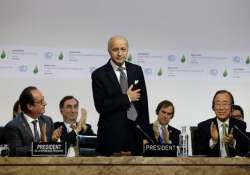It's a deal: Historic climate change agreement adopted in Paris
Le Bourget, France: In a historic development, governments today adopted a global climate pact that for the first time asks all countries to limit their greenhouse gas emissions. The approval, which came amid a prolonged and

Le Bourget, France: In a historic development, governments today adopted a global climate pact that for the first time asks all countries to limit their greenhouse gas emissions. The approval, which came amid a prolonged and loud applause, follows hectic meetings by negotiators from around 200 countries.
Some delegates started crying, others embraced as French Foreign Minister Laurent Fabius gaveled the agreement at midnight Indian time.
More than 190 countries had been negotiating the pact for four years after earlier attempts to reach such a deal failed.
Earlier today, France presented negotiators with what it called a "final draft" of an unprecedented climate deal to slow global warming and urged them to approve it. The deal would slow rising temperatures and sea levels, and eventually hold man-made emissions to the levels that nature can absorb.
With the Paris agreement now approved, countries would be committed to keeping the rise in global temperatures by the year 2100 compared with pre-industrial times "well below" 2 degrees Celsius (3.6 degrees Fahrenheit) and "endeavor to limit" them even more, to 1.5 degrees Celsius. That was a key demand of poor countries ravaged by the effects of climate change and rising sea levels.
They would also be committed to limiting the amount of greenhouse gases emitted by human activity to the same levels that trees, soil and oceans can absorb naturally, beginning at some point between 2050 and 2100.
The deal, meant to take effect in 2020, would be the first to ask all countries to join the fight against global warming, representing a sea change in the U.N. talks, which previously required only wealthy nations to reduce their emissions.
The climate change conference came out with an ambitious final draft of a deal that proposes limiting global warming to "well below" 2 degrees Celsius and committing USD 100 billion a year from 2020 to help developing countries in coping with the problem.
India today welcomed the final draft of an ambitious climate deal as "balanced" and said its concerns have been taken care of in the document.
Environment Minister Prakash Javadekar said the differentiation between developed and developing countries, which India has been demanding, is mentioned across all the pillars of action including mitigation, adaptation, finance and access to technology.
Terming it as an "important achievement" for India, Javadekar said that "sustainable lifestyles and climate justice" which have been espoused by it also get a mention in the final 31-page draft.
He said French President Francois Hollande also called Prime Minister Narendra Modi after the final draft text was unveiled.
"After the first glace of the final text, we are happy that the text contains and take care of concerns of India. It is linked with the convention (United Nations Framework Convention for Climate Change (UNFCCC) while Common But Differentiated Responsibilities (CBDR) is imbibed in it," Javadekar said.
(With agency inputs)